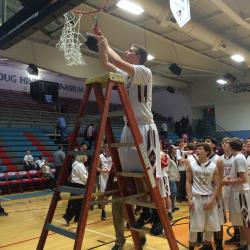Who knew that such life lessons could come from playing a game?
Last Friday night marked the close of a monumental chapter of my life: high school.
After four long years of school, 143 classmates and I accepted our diplomas from Webster County Schools’ Superintendent, Dr. Rachel Yarbrough. We moved our tassels from right to left and tossed our hats (and bouncy balls) into the air.
It’s a happy and significant event in a young person’s life.
I realized that my time as a Trojan basketball player had come to an end.
I also felt an emotion that can be summed up in one word: bittersweet.
One reason is basketball.
I’ll never get to put on my jersey again.
I won’t get a chance to come onto the court with our band playing the fight song.
No longer will I play before rowdy, loyal fans at Trojan Gym.
Never again.
 I now know to be true what former players told me: “Enjoy it while you can because it will be over before you know it.”
I now know to be true what former players told me: “Enjoy it while you can because it will be over before you know it.”
Well, it is true.
I remember the first practice of my freshman year like it was yesterday. But even though practices and games are a thing of the past, the memories and life lessons I learned are everlasting.
While I’ve had stellar teachers in class, some of the greatest lessons in high school came on the court.
Three in particular….
A Strong Work Ethic = Success
I developed a strong work ethic during my first days as a basketball freshman. “Successful players work when no one is watching,” Coach Ken Hayes told us.
That mindset helped me become a better basketball player.
I’ve loved the game, but it wasn’t until I ‘pushed’ that I reached my full potential. I came to understand the connection between work ethic and life success.
When Adversity Hits, Just Keep Going
It’s not just about being pushed. It’s also about pushing yourself. It helps you manage adversity successfully.

Courtesy: Journal-Enterprise
A good example is how I looked at running ‘suicides.’ At first it seemed like torture. The coaching staff just kept on putting 30 seconds on the clock until every single member of the team made it.
But then I realized that running suicides is a way to prepare for in-game situations. Our game against McCracken County this season is a prime example.
The visiting Mustangs led by as much as 25 points in the third quarter and had a 19-point edge going into the fourth. But my teammates and I knew this: if we could survive something as tedious as fifteen, 30-second suicides in a row, we could win this game.
We unleashed a full-court, man-to-man press. We rallied, forcing the game into overtime.
Yeah, we lost in the second OT, but never in my life have I been so content with a loss. Why? My brothers and I rallied in the face of adversity.
Adversity is a part of everyday life and we know how to face it.
Growing In Leadership
I wasn’t mentally tough enough as an incoming freshman to play high school basketball. Junior teammate, Zach Pugh, stepped up and helped me toughen up.
Pugh didn’t know me that well personally, but he wouldn’t let me quit. He would talk to me, encourage me, and make sure that I was doing everything to reach my full potential. He’s probably the reason that I pressed through that grueling freshman season and stayed with basketball.
Later, it was my turn to be the mentor that Pugh was to me.

Courtesy: The Gleaner
A player named Reagan Roland came out for basketball during my junior year. Reagan had not played basketball since middle school and–to blunt about it–he wasn’t in shape to play the game competitively.
I made sure I was always right beside Reagan. I encouraged him. I wouldn’t allowing him to quit.
I did for him what Zach did for me.
What happened? Between his junior and senior year Reagan shed over 75 pounds, improved his mile time by about three minutes, and (most importantly) became a basketball player. He might even has a chance to play college ball. He has an “I can!” attitude.
*****************************
It’s much easier to tear down people than to build them up. But if high school basketball taught me anything, it’s this: being a positive leader is the way to go.
Who knew that such life lessons could come from playing a game?














